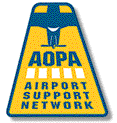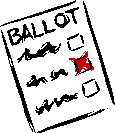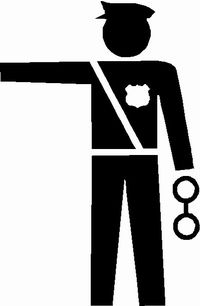AOPA, On Washington State GA Taxes
 Last week, we ran a couple articles on
Washington's crusade to get pilots, mechanics, and other FAA
certificate-holders to get on the state's list, and pay the special
taxes that were designed, just for them.
Last week, we ran a couple articles on
Washington's crusade to get pilots, mechanics, and other FAA
certificate-holders to get on the state's list, and pay the special
taxes that were designed, just for them.
We interviewed the state DoT's Theresa Smith, who told us
that there had been some clamor from "pilots' groups," asking for the taxes, so the state
could maintain its long-neglected runways. They're raising the tax
on av-gas, too, by 33%. The the tax exemptions (there's always
exemptions -- it's the nature of politicians) don't go to small GA,
with the final effect's being (her words), 95% of the [aviation]
people don't pay the tax. [Perhaps she misinterpreted the AOPA's
outline for taxation and offer to help structure a tax bill (in the
February letter) as an endorsement of additional
taxation.]
In March, AOPA strongly opposed the state's plan to make
non-compliance a near-criminal offense.
Last week, we said we'd have a more-formal statement from
AOPA on this issue, and, sure enough, they issued a press release
the same day we published our article. At least twice earlier in
the year, AOPA had made its concerns known to the Washington DoT.
Excerpts are below, followed by the May 7 press release:
February 12, 2003
The Honorable Jim Horn, Chairman
Senate Highways and Transportation Committee
Dear Chairman Horn:
 ...We are aware the Senate Highways and
Transportation Committee has under consideration Senate Bill 5392,
a bill to increase fees for pilots and aircraft. (snip)
...We are aware the Senate Highways and
Transportation Committee has under consideration Senate Bill 5392,
a bill to increase fees for pilots and aircraft. (snip)
AOPA is disappointed that the general aviation community is the
first target for any proposed fee increase. The general aviation
community, more than any other aviation operation, will be the most
adversely impacted by Senate Bill 5392. General aviation operators
have paid fuel taxes for years as well as pilot and aircraft
registration fees while other commercial operators have been exempt
from many forms of tax. It is reported by the Washington Division
of Aviation that over 95% of aviation users are exempt under state
law from paying fees. We are upset that an increase in pilot and
aircraft registration would be considered before an attempt is even
made to collect fees from those operators presently exempt.
Shouldn't all users of the state's aviation system be asked to pay
before a group is singled out to pay more?
(snip) AOPA strongly believes that money paid by aviation users
should be used to fund the aviation system. Rather than requiring
aircraft owners to pay more, AOPA suggests the ratio of the excise
taxes deposited to the general fund be adjusted to deposit the
additional money into a fund for airport maintenance. The
legislature could consider a phased-in approach to adjusting the
ratio at which the excise tax is deposited in order to ease the
impact to the general fund.
 AOPA would prefer the legislature set the
pilot and aircraft registration fees at a fixed amount.
Senate Bill 5392 as written provides that the department of
aviation could charge $15 - $30. If that language remains, the
department would not need legislative approval before raising the
pilot or aircraft registration fee. A fee increase could be
implemented with no public comment. AOPA recommends that the
legislature fix the fee at a set amount.
AOPA would prefer the legislature set the
pilot and aircraft registration fees at a fixed amount.
Senate Bill 5392 as written provides that the department of
aviation could charge $15 - $30. If that language remains, the
department would not need legislative approval before raising the
pilot or aircraft registration fee. A fee increase could be
implemented with no public comment. AOPA recommends that the
legislature fix the fee at a set amount.
Currently Washington is one of only eight states that charge
pilot registration fees. Those states and their respective fees
are: (snip)
Overall, AOPA feels the legislature should first consider other
measures to provide the revenue necessary to support the statewide
airport system, rather than to increase fuel tax and other fees
paid by general aviation pilots. AOPA feels that not enough
consideration has been given to other necessary means or measures
to increase revenue. If the legislature is unable to reach
agreement on an amended version of Senate Bill 5392, then the
legislature should consider forming a committee made up of aviation
professionals, pilot organizations, businesses, and division of
aviation staff in order to prepare an in-depth analysis of various
aviation funding mechanisms. AOPA would gladly offer our nationwide
aviation experience to any such committee. (snip)
Andrew V. Cebula, Senior Vice President, Government and
Technical Affairs, AOPA
------
March 4, 2003
The Honorable Jim Horn, Chairman
Senate Highways and Transportation Committee
Dear Chairman Horn:
...AOPA would like to express serious concern the Association
and our membership have with Senate Bill 5961. The bill,
relating to aircraft registration, amends RCW 47.68.240 prescribing
penalties for failing to register.
 Specifically, the bill states "for
violations of RCW 47.68.220 and 47.68.230, the court in its
discretion may prohibit the violator from operating an aircraft
within the state for such period as it may determine but not to
exceed one year."
Specifically, the bill states "for
violations of RCW 47.68.220 and 47.68.230, the court in its
discretion may prohibit the violator from operating an aircraft
within the state for such period as it may determine but not to
exceed one year."
The state does not have the authority to prohibit a pilot, whose
license is issued by the Department of Transportation - Federal
Aviation Administration (FAA), from exercising the privileges of
that license. The FAA has the sole authority to enforce federal
aviation regulations that can include suspending or revoking an
airman's certificate. This policing power does not extend to the
state. (snip)
Sincerely, Keith Holt, Manager, Airport Policy, AOPA
Press Release, May 7, 2003:
AOPA weighed in on the Wash. State tax debate
FREDERICK, MD (AOPA News Service) - Washington State's Aviation
Division is caught in a budget crunch, but when it tried to balance
its books on the backs of GA pilots, AOPA cried foul.
 Instead of a 20% surcharge on top of the
excise tax they already pay, and the risk of losing their flying
privileges for up to a year if they failed to register themselves
or their aircraft, Washington State pilots will pay the same in
excise taxes and face only civil fines, thanks in part to AOPA
comments during debate on the bills.
Instead of a 20% surcharge on top of the
excise tax they already pay, and the risk of losing their flying
privileges for up to a year if they failed to register themselves
or their aircraft, Washington State pilots will pay the same in
excise taxes and face only civil fines, thanks in part to AOPA
comments during debate on the bills.
AOPA has been well aware of the infrastructure problems plaguing
Washington's Division of Aviation, caused in part by sweeping tax
exemptions given to virtually every segment of the aviation
industry except general aviation.
In February, when the state's Department of Transportation
sought to raise needed funds with sweeping tax increases, AOPA
objected strongly (see letter) and suggested alternative funding
solutions.
At the same time, the legislature was considering a bill to
tighten enforcement of the state's pilot and aircraft registration
rules by threatening criminal charges and revocation of a pilot's
right to operate for up to a year for failing to register. AOPA
responded to that threat as well, stating in a letter [see letter]
that only the federal government could restrict a pilot's access to
the national airspace system.
In part as a result of AOPA's intervention, the 20% excise tax
surcharge was dropped from the final version that was recently
signed into law, and the penalty for failing to register is now a
civil fine.
[We hope we have cleared up any misunderstanding --ed.]
 Aero-News: Quote of the Day (12.07.25)
Aero-News: Quote of the Day (12.07.25) ANN's Daily Aero-Linx (12.07.25)
ANN's Daily Aero-Linx (12.07.25) NTSB Final Report: Lafferty Jack Sea Rey
NTSB Final Report: Lafferty Jack Sea Rey Classic Aero-TV: The B29 SuperFortress Doc - History in Flight
Classic Aero-TV: The B29 SuperFortress Doc - History in Flight Airborne 12.08.25: Samaritans Purse Hijack, FAA Med Relief, China Rocket Fail
Airborne 12.08.25: Samaritans Purse Hijack, FAA Med Relief, China Rocket Fail







